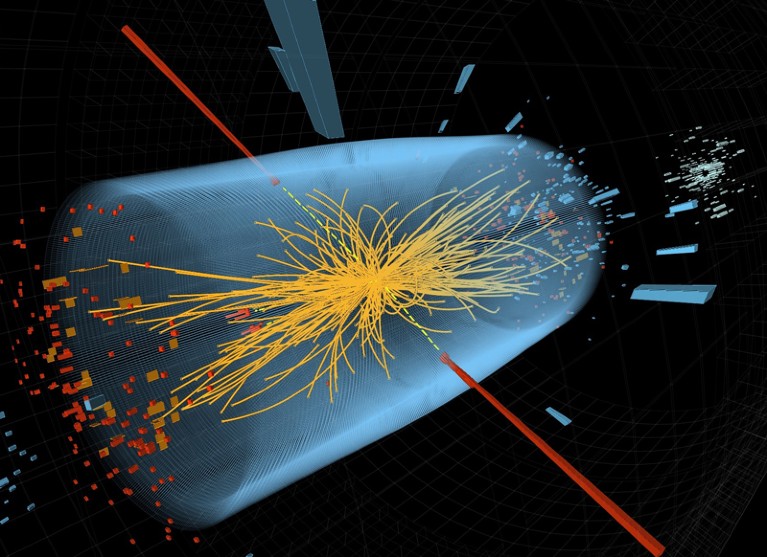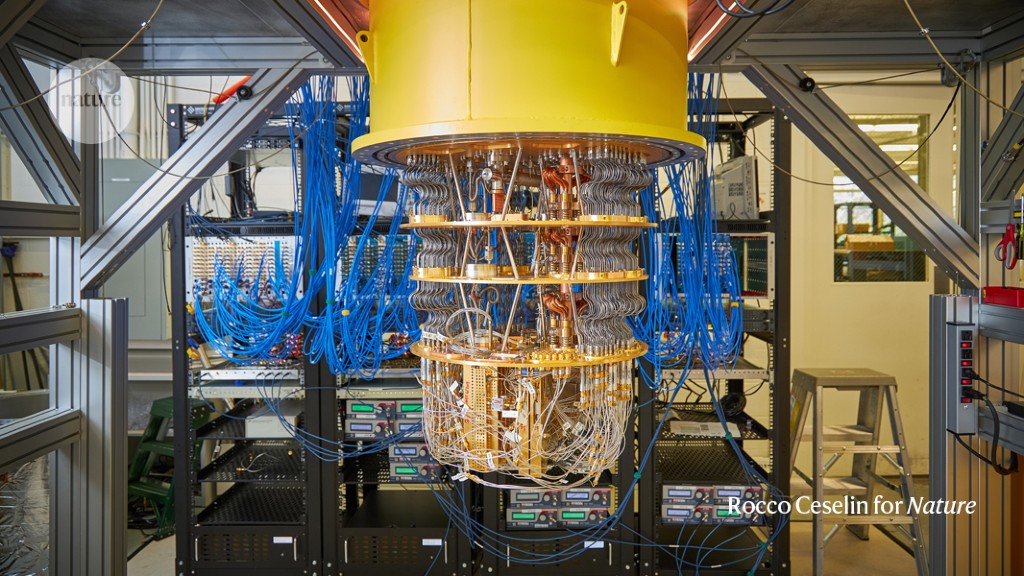Name it the Avengers of futuristic computing. Put collectively two of the buzziest phrases in expertise — machine studying and quantum computer systems — and also you get quantum machine studying. Just like the Avengers comedian books and movies, which deliver collectively an all-star forged of superheroes to construct a dream staff, the result’s more likely to entice a number of consideration. However in expertise, as in fiction, you will need to give you plot.
If quantum computer systems can ever be constructed at large-enough scales, they promise to unravel sure issues far more effectively than can peculiar digital electronics, by harnessing the distinctive properties of the subatomic world. For years, researchers have puzzled whether or not these issues may embody machine studying, a type of synthetic intelligence (AI) by which computer systems are used to identify patterns in information and study guidelines that can be utilized to make inferences in unfamiliar conditions.
Now, with the discharge of the high-profile AI system ChatGPT, which depends on machine studying to energy its eerily human-like conversations by inferring relationships between phrases in textual content, and with the fast progress within the dimension and energy of quantum computer systems, each applied sciences are making huge strides forwards. Will something helpful come of mixing the 2?
Booming curiosity
Many expertise firms, together with established firms equivalent to Google and IBM, in addition to start-up corporations equivalent to Rigetti in Berkeley, California, and IonQ in School Park, Maryland, are investigating the potential of quantum machine studying. There’s robust curiosity from tutorial scientists, too.
CERN, the European particle-physics laboratory outdoors Geneva, Switzerland, already makes use of machine studying to search for indicators that sure subatomic particles have been produced within the information generated by the Giant Hadron Collider. Scientists there are among the many teachers who’re experimenting with quantum machine studying.
“Our thought is to make use of quantum computer systems to hurry up or enhance classical machine-learning fashions,” says physicist Sofia Vallecorsa, who leads a quantum-computing and machine-learning analysis group at CERN.
The large unanswered query is whether or not there are eventualities by which quantum machine studying affords a bonus over the classical selection. Principle reveals that for specialised computing duties, equivalent to simulating molecules or discovering the prime components of enormous entire numbers, quantum computer systems will velocity up calculations that would in any other case take longer than the age of the Universe. However researchers nonetheless lack adequate proof that that is the case for machine studying. Others say that quantum machine studying might spot patterns that classical computer systems miss — even when it isn’t quicker.
Researchers’ attitudes in direction of quantum machine studying shift between two extremes, says Maria Schuld, a physicist based mostly in Durban, South Africa. Curiosity within the method is excessive, however researchers appear more and more resigned concerning the lack of prospects for short-term functions, says Schuld, who works for quantum-computing agency Xanadu, headquartered in Toronto, Canada.
Some researchers are starting to shift their focus to the concept of making use of quantum machine-learning algorithms to phenomena which might be inherently quantum. Of all of the proposed functions of quantum machine studying, that is “the realm the place there’s been a reasonably clear quantum benefit”, says physicist Aram Harrow on the Massachusetts Institute of Expertise (MIT) in Cambridge.
Do quantum algorithms assist?
Over the previous 20 years, quantum-computing researchers have developed a plethora of quantum algorithms that would, in principle, make machine studying extra environment friendly. In a seminal lead to 2008, Harrow, along with MIT physicists Seth Lloyd and Avinatan Hassidim (now at Bar-Ilan College in Ramat Gan, Israel) invented a quantum algorithm1 that’s exponentially quicker than a classical pc at fixing massive units of linear equations, one of many challenges that lie on the coronary heart of machine studying.
However in some circumstances, the promise of quantum algorithms has not panned out. One high-profile instance occurred in 2018, when pc scientist Ewin Tang discovered a approach to beat a quantum machine-learning algorithm2 devised in 2016. The quantum algorithm was designed to supply the kind of suggestion that Web procuring firms and providers equivalent to Netflix give to clients on the premise of their earlier decisions — and it was exponentially quicker at making such suggestions than any identified classical algorithm.
Tang, who on the time was an 18-year-old undergraduate pupil on the College of Texas at Austin (UT), wrote an algorithm that was nearly as quick, however might run on an peculiar pc. Quantum advice was a uncommon instance of an algorithm that appeared to supply a major velocity increase in a sensible downside, so her work “put the purpose of an exponential quantum speed-up for a sensible machine-learning downside even additional out of attain than it was earlier than”, says UT quantum-computing researcher Scott Aaronson, who was Tang’s adviser. Tang, who’s now on the College of California, Berkeley, says she continues to be “fairly sceptical” of any claims of a major quantum speed-up in machine studying.
A doubtlessly even greater downside is that classical information and quantum computation don’t all the time combine effectively. Roughly talking, a typical quantum-computing utility has three foremost steps. First, the quantum pc is initialized, which signifies that its particular person reminiscence items, referred to as quantum bits or qubits, are positioned in a collective entangled quantum state. Subsequent, the pc performs a sequence of operations, the quantum analogue of the logical operations on classical bits. Within the third step, the pc performs a read-out, for instance by measuring the state of a single qubit that carries details about the results of the quantum operation. This could possibly be whether or not a given electron contained in the machine is spinning clockwise or anticlockwise, say.
The thinnest of straws
Algorithms such because the one by Harrow, Hassidim and Lloyd promise to hurry up the second step — the quantum operations. However in lots of functions, the primary and third steps could possibly be extraordinarily gradual and negate these positive factors3. The initialization step requires loading ‘classical’ information on to the quantum pc and translating it right into a quantum state, typically an inefficient course of. And since quantum physics is inherently probabilistic, the read-out typically has a component of randomness, by which case the pc has to repeat all three levels a number of occasions and common the outcomes to get a ultimate reply.
As soon as the quantumized information have been processed right into a ultimate quantum state, it might take a very long time to get a solution out, too, in line with Nathan Wiebe, a quantum-computing researcher on the College of Washington in Seattle. “We solely get to suck that data out of the thinnest of straws,” Wiebe mentioned at a quantum machine–studying workshop in October.
“While you ask nearly any researcher what functions quantum computer systems shall be good at, the reply is, ‘In all probability, not classical information,’” says Schuld. “To this point, there isn’t a actual purpose to consider that classical information wants quantum results.”
Vallecorsa and others say that velocity will not be the one metric by which a quantum algorithm ought to be judged. There are additionally hints {that a} quantum AI system powered by machine studying might study to acknowledge patterns within the information that its classical counterparts would miss. That is likely to be as a result of quantum entanglement establishes correlations amongst quantum bits and due to this fact amongst information factors, says Karl Jansen, a physicist on the DESY particle-physics lab in Zeuthen, Germany. “The hope is that we will detect correlations within the information that might be very exhausting to detect with classical algorithms,” he says.

Quantum machine studying might assist to make sense of particle collisions at CERN, the European particle-physics laboratory close to Geneva, Switzerland.Credit score: CERN/CMS Collaboration; Thomas McCauley, Lucas Taylor (CC BY 4.0)
However Aaronson disagrees. Quantum computer systems observe well-known legal guidelines of physics, and due to this fact their workings and the end result of a quantum algorithm are completely predictable by an peculiar pc, given sufficient time. “Thus, the one query of curiosity is whether or not the quantum pc is quicker than an ideal classical simulation of it,” says Aaronson.
Elementary quantum change
One other risk is to sidestep the hurdle of translating classical information altogether, by utilizing quantum machine-learning algorithms on information which might be already quantum.
All through the historical past of quantum physics, a measurement of a quantum phenomenon has been outlined as taking a numerical studying utilizing an instrument that ‘lives’ within the macroscopic, classical world. However there may be an rising thought involving a nascent method, generally known as quantum sensing, which permits the quantum properties of a system to be measured utilizing purely quantum instrumentation. Load these quantum states on to a quantum pc’s qubits immediately, after which quantum machine studying could possibly be used to identify patterns with none interface with a classical system.
Relating to machine studying, that would provide huge benefits over programs that gather quantum measurements as classical information factors, says Hsin-Yuan Huang, a physicist at MIT and a researcher at Google. “Our world inherently is quantum-mechanical. If you wish to have a quantum machine that may study, it could possibly be far more highly effective,” he says.
Huang and his collaborators have run a proof-of-principle experiment on one in every of Google’s Sycamore quantum computer systems4. They devoted a few of its qubits to simulating the behaviour of a form of summary materials. One other part of the processor then took data from these qubits and analysed it utilizing quantum machine studying. The researchers discovered the method to be exponentially quicker than classical measurement and information evaluation.
Is it a superconductor?
Doing the gathering and evaluation of information absolutely within the quantum world might allow physicists to deal with questions that classical measurements can solely reply not directly, says Huang. One such query is whether or not a sure materials is in a selected quantum state that makes it a superconductor — capable of conduct electrical energy with virtually zero resistance. Classical experiments require physicists to show superconductivity not directly, for instance by testing how the fabric responds to magnetic fields.
Particle physicists are additionally trying into utilizing quantum sensing to deal with information produced by future particle colliders, equivalent to at LUXE, a DESY experiment that may smash electrons and photons collectively, says Jensen — though the concept remains to be no less than a decade away from being realized, he provides. Astronomical observatories far other than one another may additionally use quantum sensors to gather information and transmit them — by way of a future ‘quantum web’ — to a central lab for processing on a quantum pc. The hope is that this might allow photos to be captured with unparalleled sharpness.
If such quantum-sensing functions show profitable, quantum machine studying might then have a task in combining the measurements from these experiments and analysing the ensuing quantum information.
Finally, whether or not quantum computer systems will provide benefits to machine studying shall be determined by experimentation, reasonably than by giving mathematical proofs of their superiority — or lack thereof. “We will’t anticipate all the things to be proved in the way in which we do in theoretical pc science,” says Harrow.
“I definitely suppose quantum machine studying remains to be price learning,” says Aaronson, whether or not or not there finally ends up being a lift in effectivity. Schuld agrees. “We have to do our analysis with out the confinement of proving a speed-up, no less than for some time.”

